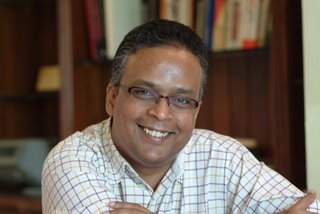Everyone born before 1980 in India is a foreigner in his own country. The current generation thinks and behaves so differently from its predecessors, that it is OK to feel bewildered. Here are a few commonly held myths and the reality as captured by repeated studies done by Euro RSCG in India.
Before we get into the myths, a few words about the source of our data. We have interviewed over 4000 people in 20 cities over the last two years. We have a technique that predicts trends by studying what opinion spreaders think today. The "reality" below are not universal realities yet, but reflect the trends that we have spotted in the Indian market.
Myth: Young people always rebel against their parents.
That is so 1960s. Flower power and all that. Today's youth thinks that the most important role models for them are their parents. Parents rank way higher than iconic figures like Shahrukh Khan, Mahender Singh Dhoni and Barkha Dutt.
Dhoni and Barkha Dutt. Keep those two names in mind as you read further.
Myth: Trends trickle down from the big cities like Mumbai and Delhi.
Don't even mention this to Dhoni. Or to Sunil Mittal. Or the champion boxers from Bhiwani. These stars of today are not learning from their big city colleagues - they are teaching them. Teaching them the softer skills of winning. Teaching them values and a new work ethic. It is for this reason that we believe today's trends are not trickling down, but bubbling up.
Myth: Young people in India need help to succeed.
The stars we spoke of earlier, back themselves with an extremely high level of self belief. They are confident, almost arrogantly so. And they know that they will make their dreams come true. No matter what.
Today's youngster believes that she doesn't need to be born into a privileged family to achieve greatness. Apart from the usual sporting heroes, they point to a Barkha Dutt who has already had a movie made on her life. And she is still young!
Myth: Youth dream of America.
No longer. Even before the sub prime crisis and the economic meltdown, Indian youth had cooled off on the great American dream. They would still like to visit Firangland, but they don't want to go and live there. They are proud to be Indian and want to raise their families here.
Not only that, they no longer want to pay premiums for the "Foreign made" label. They actually believe that products made in India are more suited to local conditions and local hair and skin types. Quite a far cry from the days when even "export reject" products commanded a premium.
Myth: Indian women are either doormats or militant feminists.
For societies to change, women have to change first. Indian women are experiencing really dramatic changes. All the above insights apply to her, of course. But in addition we have to understand here new balanced approach to life.
Earlier women defined themselves by their roles. She was somebody's wife, mother, daughter or daughter in law. On the other extreme, she became a militant feminist like Rajani or Lalitaji. Today's women have developed a whole new approach. They have strong views on everything and a pretty clear set of objectives to achieve. However they are flexible in the route to achieving those objectives. They try to take others along rather than just bulldoze through the system. This "strategic" approach can be seen in movies and TV serials. Jassi in "Jassi jaisi koi nahin" was a good example.
So why are these dramatic changes taking place? Why is it that older people have become foreigners in their own land? Our belief is that there is a violent cultural remixing taking place in India and some other emerging markets. Global culture is colliding quite suddenly and dramatically with a strong entrenched local culture. The resultant is a hybrid that is as new and exciting as the culture of the flower power years.
But why now? There are a few reasons why the remixing is happening more now than ever before.
Older people are used to thinking of India as an agrarian economy. Jai Jawan Jai Kisan has been a slogan from the mid 1960s at least. Today that is no longer true. Only 21% of our GDP comes from agriculture and around one third of our people derive their incomes from it. India is today a service economy and people haven't quite got their heads around that fact.
The second big change is the rise of the backward castes in India's economic and political life. This is a politically incorrect subject to discuss, but I believe that today's business leaders all have a brahmanical view of the world, which is out of sorts with the current reality.
Aside from the two big changes, there are several smaller changes taking place. This is the third generation of nuclear families and so the ties of the joint family system are all gone. And with it are gone the old traditions and customs. Indians are seeing the world more - either through travel or through the media coming into their homes. This is broadening their minds and extending their horizons.
All these changes have taken place in a very quick time. Just a little more than a decade. In the context of cultural changes, that is a mere instant.
